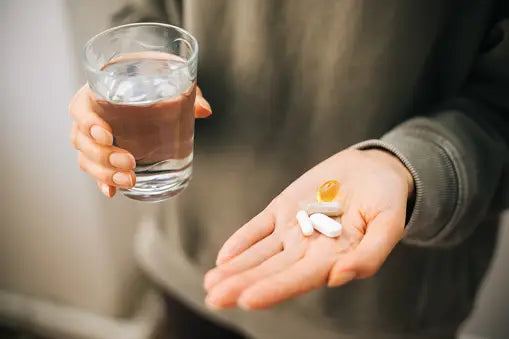

Caffeine Advantage for Getting Shredded
Table of Contents
Sculpt Your Physique with Caffeine
by: Robbie Durand
Caffeine is a plant alkaloid found in coffee, chocolate, and tea, widely consumed by humans worldwide. Caffeine has long been part of the pre-workout regimen for all gym advocates and professional athletes. Caffeine is well-known as a central nervous system stimulant. Studies have shown that caffeine can help an athlete perform better in a variety of different activities. It has been shown to be a potent ergogenic aid that is beneficial in athletic performance and training.
Caffeine has been shown to increase speed and power output, improve the length an athlete can train, and assist the athlete in resisting fatigue. Caffeine has also been proven to stimulate the brain, which contributes to an athlete’s clearer thinking and ability to concentrate harder on the task at hand. Caffeine is not just good for improving sports performance but also increases energy metabolism according to new research.
Caffeine Inhibits the Formation of New Fat Cells

Human studies have shown that caffeine stimulates thermogenesis and fat oxidation. A study a few months ago reported that caffeine can prevent new fat cell formation. Blocking of adipocyte differentiation or the process of cell differentiation by which preadipocytes become mature adipocytes. Blocking new fat cells for becoming mature fat cells is one of the anti-obesity strategies for the future. In recent years, many groups have explored novel compounds derived from natural resources for their effect on preventing new fat cell formation. Researchers found high dose caffeine in test tubes inhibits pre-adipocyte growth and differentiation, meaning caffeine inhibited new fat cells from maturing into mature fat cells. One of the key pathways in which caffeine inhibited new fat cells from being formed was AKT. It is a crucial enzyme in the insulin signaling pathway in adipocytes, AKT is needed for insulin-induced glucose metabolism, glucose transport, and adipocyte differentiation.

The results of the study demonstrated that caffeine significantly decreased the activation of AKT in a dose-dependent manner in adipocytes. The findings showed that caffeine actively suppressed the expression of critical genes involved in the creation of new fat cells or adipogenesis and reduced lipid storage in adipocytes. This is the first study to show that caffeine not only enhances fat utilization, but now it may help preventing pre-fat cells from becoming mature fat cells, so make sure your fat burner has caffeine!
Caffeine Use Associated with Weight Loss
 Some of you may not be a fan of test tube studies, you may want more concrete results with human studies. Habitual caffeine intake has been shown to decrease body weight. Interestingly, High caffeine intake was associated with weight loss through thermogenesis and fat oxidation and with suppressed leptin in women.
Some of you may not be a fan of test tube studies, you may want more concrete results with human studies. Habitual caffeine intake has been shown to decrease body weight. Interestingly, High caffeine intake was associated with weight loss through thermogenesis and fat oxidation and with suppressed leptin in women.
Leptin is a critical hormone involved in weight maintenance. Leptin production in white adipose tissue is regulated by the sympathetic nervous system through β3 adrenoceptors. Leptin has a more profound effect when a person loses weight and levels of leptin fall. This stimulates an enormous appetite and increased food intake. When leptin levels are high, neural, hormonal, and metabolic afferent signals, lead to a decreased appetite.
One study observed a statistically significant inverse association between coffee consumption and leptin concentration. This means it’s like a see-saw effect for leptin and coffee consumption.

A new study published in the European Journal of Clinical Nutrition just published an interesting article titled, “Caffeine intake is related to successful weight loss maintenance.” The study examined daily consumption of coffee and caffeinated beverages between 494 weight loss maintainers and 2129 individuals from the general population controlling for sociodemographic variables, body mass index and physical activity level. Weight loss maintainers reported to consume significantly more cups of coffee and caffeinated beverages compared with the participants in the general population sample. Thus, consumption of caffeinated beverages might support weight loss maintenance.
There are many fat burners that have no caffeine, but it seems based on the science, adding caffeine to your daily routine is associated with greater weight loss.
Icken D, Feller S, Engeli S, Mayr A, Müller A, Hilbert A, de Zwaan M. Caffeine intake is related to successful weight loss maintenance. Eur J Clin Nutr. 2015
Dulloo, A. G., Geissler, C. A., Horton, T., Collins, A., Miller, D. S. (1989) Normal caffeine consumption: influence on thermogenesis and daily energy expenditure in lean and postobese human volunteers. Am J Clin Nutr 49: 44–50.
Astrup, A., Toubro, S., Cannon, S., Hein, P., Breum, L., Madsen, J. (1990) Caffeine: a double-blind, placebo-controlled study of its thermogenic, metabolic, and cardiovascular effects in healthy volunteers. Am J Clin Nutr 51: 759–767.
Bracco, D., Ferrarra, J. M., Arnaud, M. J., Jequier, E., Schutz, Y. (1995) Effects of caffeine on energy metabolism, heart rate, and methylxanthine metabolism in lean and obese women. Am J Physiol E671–E678.
Smith A (2002) Effects of caffeine on human behavior. Food Chem Toxicol 40, 1243-1255
Schubert, Matthew M., et al. “Caffeine consumption around an exercise bout: effects on energy expenditure, energy intake, and exercise enjoyment.” Journal of Applied Physiology 117.7 (2014): 745-754.
Nakabayashi H, Hashimoto T, Ashida H, Nishiumi S and Kanazawa K (2008) Inhibitory effects of caffeine and its metabolites on intracellular lipid accumulation in murine 3T3-L1 adipocytes. Biofactors 34, 293-302.
Trayhurn, P., Hoggard, N., Mercer, J. G., Rayner, D. V. (1999) Leptin: fundamental aspects. Int J Obes Relat Metab Disord 23: S22–S28.
Hongu, N., Sachan, D. S. (2000) Caffeine, carnitine and choline supplementation of rats decreases body fat and serum leptin concentration as does exercise. J Nutr 130: 52–57.

















